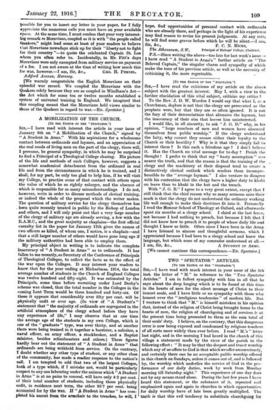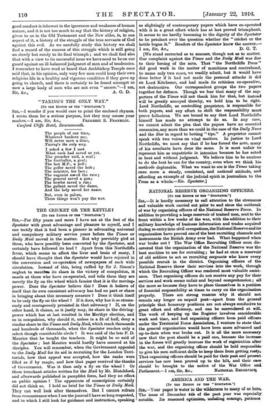TWO " SPECTATOR " ARTICLES.
[TO TUB EDITOR OF TRH SPECTATOR."[ SIB,—I have read with much interest in your issue of the 8th inst. the letter of " M." in reference to the " Two Spectator Articles." I am in fullest sympathy with him in all that he says about the deep longing which is to be found at this time in the hearts of men for the silent message of Christ to their inmost souls, and I have little or no sympathy with those who lament over the " irreligious tendencies " of modern life. But I venture to think that " M." is himself mistaken in his opinion that, instead of the religion of Christ being brought home to the hearts of men, the religion of churchgoing and of services is at the present time being presented to them as the sum total of their souls' duty. I believe, on the contrary, that this dangerous error is now being exposed and condemned by religious teachers of all sorts more widely than ever before. I read " M.'s " letter last night, and in the morning I had heard in the church of this village a statement made by the vicar of the parish to the following effect : " It may be that the deepest and truest worship which any of us offers to God is that which we offer unconsciously, and certainly there can be no acceptable public worship offered in this church on Sundays, unless it comes out of, and is followed by, the worship which underlies the service of God in the per- formance of our daily duties, week by week from Monday morning till Saturday night." This experience of one day does not by any means stand alone. During the last few years I have heard this statement, or the substance of it, repeated and emphasized again and again in churches in which opportunities for daily worship have of late been greatly multiplied. The truth is that this evil tendency to substitute churchgoing for
good conduct is inherent in the ignorance and weakness of human nature, and it is not too much to say that the history of religion, given to us in the Old Testament and the New alike, is, in one aspect of it, a history of the struggle of the true servants of God against this evil. As we carefully study this history we shall find a record of the success of this struggle which is still going on slowly but surely to its final triumph ; and we shall find also that with a view to its successful issue we have need to be on our guard against an ill-balanced judgment of men and of tendencies. I remember to have read or heard that Archbishop Temple once said that, in his opinion, only very few men could keep their own religious life in a healthy and vigorous condition if they gave up going to church, and there is certainly to be found amongst us now a large body of men who are not even " oncers."—I am,



































 Previous page
Previous page